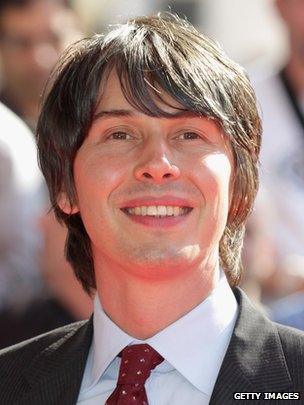Brian Cox: Science cash hike 'a wise gamble'
- Published

Boosting public funding could reap dividends and carries little risk, says Prof Cox
Television presenter and physicist Prof Brian Cox has argued that boosting public funds to science would be a "sensible gamble".
He said that a cash increase would yield huge benefits and make the UK the best place to do research.
Speaking at the British Science Festival in Aberdeen, Prof Cox also underlined the importance of public engagement with science in the UK.
He was in Aberdeen to unveil a plaque to physicist George Paget Thompson.
The Manchester University researcher was speaking before his guest lecture at the festival.
Prof Cox considered that public engagement, in whatever guise, was absolutely key to the future sustainability and growth of British science.
He said it was crucial to maintain a wider interest and to nurture children and students to be the next generation of scientists and engineers.
Prof Cox also lamented the level to which UK research is currently funded.
"The UK science budget is about £5.5bn each year… on a government spend of over 600 billion.
"That's for everything - medical research, Cern, engineering, arts and humanities; the whole thing.
"It's below most global averages, the OECD's for example," he said.
Even in the current economic climate, he considered increased science and engineering investment would reap dividends and, given the size of the current deficit, would be a wise gamble irrespectively.
"I think we should undoubtedly double the science budget", he said.
"44-45% of GDP comes from knowledge intensive services - virtually half our national wealth is generated in that sector.
"Let's say you decide to double the science budget - the worse that can happen is you add £5bn onto the deficit - a drop in the ocean. The best that can happen is, by doing that, you make this country the best place in the world to do science and engineering and on the basis of that almost half of our economy is transformed.
"It seems to me to be a sensible gamble."
But increased funding is unlikely to come without more public support and understanding of what science is achieving and can achieve. And on returning to this matter Prof Cox seemed convinced:
"At its heart, at its very foundation, it's tax-payer funded", he said.
"People [need to] understand what scientific research is doing now, what the potential is and also, importantly, what happens if you stop doing it."
"Science festivals, science in the media, science on television are important because you are building public support [and this] is self-evidently sensible."
Quantum Plaque
Prof Cox spoke just after unveiling a plaque celebrating the Nobel-prize winning work of Sir George Paget Thomson.
The technique of electron diffraction that Thomson devised experimentally proved the theory of wave-particle duality from the 1920s: that electrons behave as waves, even though they are particles contained within the structure of atoms.
"It was the experiment that showed sub-atomic particles are not as you might imagine. They're not like little grains of sand. They behave as extended objects," Prof Cox told BBC news.
This evidence of this paradox led to a deeper understanding of quantum theory.
"If I put a particle here, where will it be in the next moment of time? Well the answer is anywhere in the Universe with equal probability. It's absolutely bizarre, but that is, in essence, what quantum theory says," he explained.
By passing the electrons through small slits in a metal film, Thompson was able to observe the duality.
Although this conclusion was also reached simultaneously by a group in America, Prof Cox added that the pioneering research in Aberdeen was only possible due to the skill of Charles Fraser - who is also honoured on the plaque - who worked on the metal needed for the experiment.
"He made foils of gold so thin that the electrons would go through and behave in this really odd way," said Prof Cox.
- Published4 July 2012
- Published26 July 2012